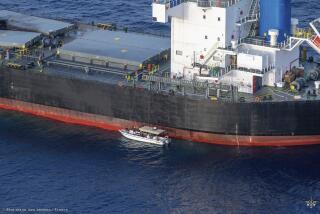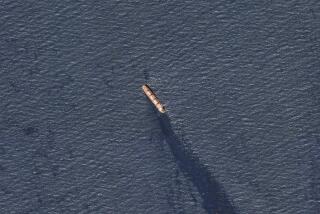Banned Chemicals Found on Ship With Cargo From China
- Share via
WASHINGTON — A ship carrying cargo from China to the Middle East was recently inspected and found to contain illegal chemicals used for making dangerous weapons, U.S. officials acknowledged Friday.
The ship Asian Senator, which is of German origin, was examined at a Saudi Arabian port in a new demonstration of the intensified U.S. and international campaign to stop the spread of deadly weapons and chemicals.
The episode is likely to touch off an exhaustive effort to determine who was responsible for arranging the sale of the chemicals--a Chinese manufacturer, the shipper, the purchaser or a third-party intermediary.
The officials emphasized that the ship itself was not Chinese and that there is no indication at this point that Chinese authorities were responsible for, or even aware of, the shipment.
The Chinese Embassy in Washington had no immediate comment.
“The Chinese cooperated fully in the investigation, and they agreed that what was found was not good stuff,” one State Department official said.
International agreements prohibit the export of a number of chemicals that can be used to manufacture nuclear, chemical and biological weapons and missiles.
U.S. officials did not specify Friday exactly what chemicals were found, but they said there was no doubt that the export of the chemicals was a violation.
According to some sources, the ship was carrying the chemicals to Iraq.
State Department officials say that fact has not been confirmed.
If Iraq was in fact the destination, the shipment would be in violation of the U.N. sanctions against Saddam Hussein, and any countries found responsible could be called before the U.N. Security Council.
The new incident is reminiscent of the episode last summer in which American planes and warships for weeks tracked a Chinese ship, the Yin He, which U.S. intelligence officials believed was carrying chemical-weapons ingredients from China to Iran.
But there are important differences between the two cases.
The earlier incident involved a Chinese ship carrying a Chinese cargo. The Chinese government complained angrily that there were no dangerous chemicals aboard the Yin He, and those protests led to a nasty diplomatic confrontation with the United States.
In the end, an inspection of the Yin He at a Saudi Arabian port turned up no evidence of any chemical weapons precursors.
This time, U.S. officials said, there was no diplomatic confrontation between American and Chinese authorities.
And the inspection in Saudi Arabia this time was said to have turned up solid evidence of the dangerous chemicals.
It was not immediately known Friday how or why the German ship was required to submit to the inspection at the Saudi port.
U.S. intelligence officials have made it clear that they are monitoring the shipments of chemicals, weapons and technology from China to the Middle East.
According to U.S. officials, the Asian Senator is one of a number of ships owned by Germany’s Senator lines. Although the ships are used primarily to transport cargo, some also rent out luxury cabins for small numbers of passengers who want the experience of traveling the world by freighter.
A 1992 description of the Asian Senator’s facilities in the New York Times Travel section proclaimed: “Capacity five passengers, outdoor pool, international cuisine with German specialties, one sitting.” For the fee of $7,960, the ship offered an 84-night cruise.
The officials said the Asian Senator has some “space-sharing” arrangements to trade open space and cargoes with other ships from Germany and from South Korea--thus raising the possibility that the owners of the Asian Senator may have taken on the chemical shipments from someone else at the last minute and without knowing what was in the cargo.
The ship made a number of stops on the way to the Middle East.
According to sources familiar with the investigation of the incident, the Asian Senator stopped at the South Korean port of Pusan on Nov. 28, in Hong Kong on Dec. 3, in Singapore on Dec. 7 and in Saudi Arabia on Dec. 18.
Over the last seven years, exports of dangerous weapons and materials from China to the Middle East have been one of the most sensitive and divisive issues between Washington and Beijing.
The issue first arose in 1987, when the Ronald Reagan Administration complained bitterly that China was selling Silkworm anti-ship missiles to Iran.
Secretary of State Warren Christopher is preparing to meet Foreign Minister Qian Qichen in Paris on Monday in the latest of a series of high-level contacts between the Clinton Administration and the Chinese government.
More to Read
Sign up for Essential California
The most important California stories and recommendations in your inbox every morning.
You may occasionally receive promotional content from the Los Angeles Times.












